
China to intensify crackdown on shadow banking sector as credit risk rises
Regulators have already used administrative methods to control credit growth.
Bank loans continue to provide the majority of credit in mainland China, although other sources of capital - such as corporate bonds, trust loans and private equity financing - are expanding their reach and sophistication with each year that passes, according to BMI Research. Within this, state-owned enterprises (SOEs) receive preferential treatment vis-a-vis access to capital and lower financing costs, as lenders perceive these entities to have an implicit government guarantee and hence lower risk profiles.
Here's more from BMI Research:
While lending activity is expected to continue growing more broadly across the duration of our forecast period, we highlight that this will come in tandem with a further crackdown by the state on risky lending activity in the sector from the People's Bank of China (PBoC). To-date, regulators have employed the use of administrative methods such as reserve requirements, lending quotas, and loan-to-deposit ratios to control credit growth in China; however, we expect to see policymakers to attempt to rein-in financial risks and ensure stability ahead of the 19th National Party Congress scheduled for H217.
In particular, we believe the focus of the regulator's efforts will be on both further clamping down on the poor practices of China's 'shadow banking' sector, which includes vehicles such as wealth management products and trust products, and which has been growing even more rapidly than that of the bank loan market over recent years.
While the Chinese authorities have taken successive steps to increase the transparency and strengthen the supervision of such activities, while also permitting their continued development, the significant build up in credit over recent years (as in many cases, these products increase channels for private firms to obtain capital at market rates) means that credit risk - especially in the corporate sector - is elevated. According to data from the Bank of International Settlements (BIS), non-financial corporate debt as a share of GDP for the mainland economy rose rapidly to 166.2% as of Q316 from 119.9% at Q411.
Away from increasing the level of regulatory oversight on the shadow banking sector, we believe that the most immediate and direct means of controlling credit growth more broadly sits with monetary policy, and more specifically, through the PBoC continuing to adopt a gradual tightening bias.
In this vein, we expect the central bank to raise interest rates on its targeted tools such as its medium-term lending facilities (MLF) and open-market operations (OMO) instruments. Indeed, the central bank has already raised interest rates on these instruments three times since the start of 2017, with the benchmark 1-year lending rate still holding steady at 4.35%.
It will continue to attempt to strike a balance between reining in excessive short-term borrowing and ensuring that there is sufficient liquidity in the financial system to support economic activity. Therefore, we also believe that the central bank will also rely on longer-term policy tools to inject liquidity over short-term operations.



















 Advertise
Advertise











